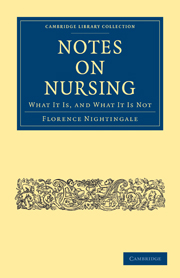Book contents
- Frontmatter
- PREFACE
- Contents
- Introductory
- I Ventilation and Warming
- II Health of Houses
- III Petty Management
- IV Noise
- V Variety
- VI Taking Food
- VII What Food
- VIII Bed and Bedding
- IX Light
- X Cleanliness of Rooms and Walls
- XI Personal Cleanliness
- XII Chattering Hopes and Advices
- XIII Observation of the Sick
- Conclusion
- Supplementary Chapter
- NOTES ON NURSING
VI - Taking Food
Published online by Cambridge University Press: 05 August 2011
- Frontmatter
- PREFACE
- Contents
- Introductory
- I Ventilation and Warming
- II Health of Houses
- III Petty Management
- IV Noise
- V Variety
- VI Taking Food
- VII What Food
- VIII Bed and Bedding
- IX Light
- X Cleanliness of Rooms and Walls
- XI Personal Cleanliness
- XII Chattering Hopes and Advices
- XIII Observation of the Sick
- Conclusion
- Supplementary Chapter
- NOTES ON NURSING
Summary
Every careful observer of the sick will agree in this that thousands of patients are annually starved in the midst of plenty, from want of attention to the ways which alone make it possible for them to take food. This want of attention is as remarkable in those who urge upon the sick to do what is quite impossible to them, as in the sick themselves who will not make the effort to do what is perfectly possible to them.
For instance, to the large majority of very weak patients it is quite impossible to take any solid food before 11 a.m., nor then, if their strength is still farther exhausted by fasting till that hour. For weak patients have generally feverish nights and, in the morning, dry mouths; and, if they could eat with those dry mouths, it would be the worse for them. A spoonful of beef-tea, of arrowroot and wine, of egg flip, every hour, will give them the requisite nourishment, and prevent them from being too much exhausted to take at a later hour the solid food, which is necesssary for their recovery. And every patient who can swallow at all can swallow these liquid things, if he chooses. But how often do we hear a mutton-chop, an egg, a bit of bacon, ordered to a patient for breakfast, to whom (as a moment's consideration would show us) it must be quite impossible to masticate such things at that hour.
- Type
- Chapter
- Information
- Notes on NursingWhat It Is, and What It Is Not, pp. 90 - 97Publisher: Cambridge University PressPrint publication year: 2010First published in: 1860



